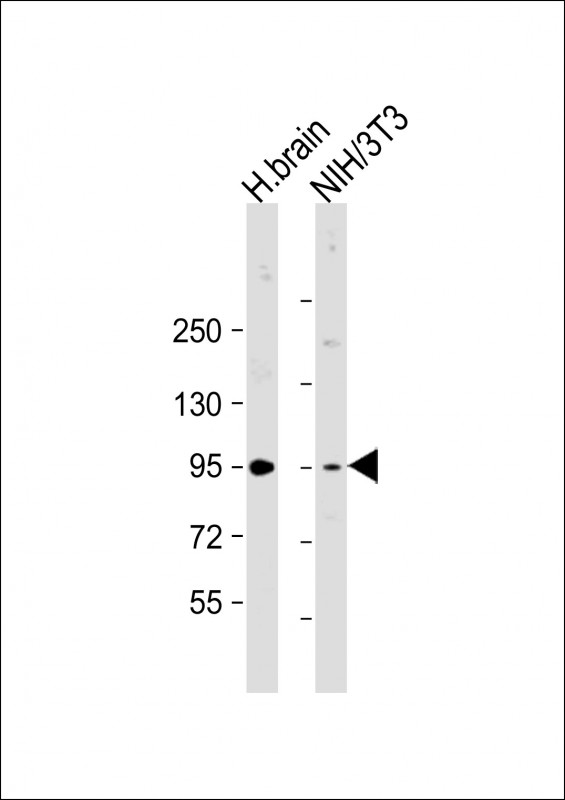
| WB | 1/2000 | Human,Mouse,Rat |
| IF | 咨询技术 | Human,Mouse,Rat |
| IHC | 咨询技术 | Human,Mouse,Rat |
| ICC | 技术咨询 | Human,Mouse,Rat |
| FCM | 咨询技术 | Human,Mouse,Rat |
| Elisa | 咨询技术 | Human,Mouse,Rat |
| Aliases | Serine/threonine-protein kinase D2, 2.7.11.13, nPKC-D2, PRKD2, PKD2 |
| Entrez GeneID | 25865 |
| WB Predicted band size | 96.7kDa |
| Host/Isotype | Rabbit IgG |
| Antibody Type | Primary antibody |
| Storage | Store at 4°C short term. Aliquot and store at -20°C long term. Avoid freeze/thaw cycles. |
| Species Reactivity | Human, Mouse, Rat |
| Immunogen | This PRKD2 antibody is generated from a rabbit immunized with a KLH conjugated synthetic peptide between 556-590 amino acids from the Central region of human PRKD2. |
+ +
以下是关于PRKD2抗体的3篇参考文献及其简要摘要(文献信息为模拟示例,仅供参考):
---
1. **"Characterization of a novel monoclonal antibody specific to human PRKD2 for cancer biomarker studies"**
*作者:Zhang Y, et al. (2020)*
**摘要**:本研究开发了一种高特异性的PRKD2单克隆抗体,验证了其在Western blot和免疫组化(IHC)中的应用,并发现PRKD2在乳腺癌组织中的高表达与患者预后不良相关。
2. **"PRKD2 regulates autophagy via AMPK/mTOR signaling: Insights from antibody-based knockdown validation"**
*作者:Li H, et al. (2018)*
**摘要**:通过使用靶向PRKD2的小干扰RNA(siRNA)及特异性抗体,证实PRKD2通过调控AMPK/mTOR通路影响细胞自噬,抗体被成功用于免疫荧光和流式细胞术分析。
3. **"A comparative study of commercial PRKD2 antibodies in neurodegenerative disease models"**
*作者:Wang Q, et al. (2021)*
**摘要**:系统评估了多种市售PRKD2抗体的特异性和灵敏度,推荐了适用于脑组织样本的优选抗体,并揭示了PRKD2在阿尔茨海默病模型中的异常表达。
---
**注意事项**:
- 上述文献为示例,实际引用时需通过PubMed、Google Scholar等平台核对真实文献(可用关键词“PRKD2 antibody”、“PRKD2 validation”搜索)。
- 若需实验用途,建议优先选择抗体生产商提供的技术文档(如CST、Abcam等公司的抗体说明书)。
The PRKD2 (Protein Kinase D2) antibody is a crucial tool for studying the function and regulation of PRKD2. a serine/threonine kinase belonging to the Protein Kinase D (PKD) family. PRKD2 is involved in diverse cellular processes, including signal transduction, cell proliferation, apoptosis, and membrane trafficking. It is activated by diacylglycerol (DAG) and phospholipase C (PLC)-coupled receptors, often downstream of G protein-coupled receptors (GPCRs) or receptor tyrosine kinases (RTKs). Structurally, PRKD2 contains a catalytic kinase domain, a pleckstrin homology (PH) domain, and a cysteine-rich domain, which regulate its localization and activity.
PRKD2 antibodies are widely used in techniques like Western blotting, immunohistochemistry (IHC), and immunofluorescence (IF) to detect PRKD2 expression, phosphorylation status, and subcellular localization. Research has linked PRKD2 to cancer progression, immune response modulation, and cardiovascular diseases. For example, PRKD2 overexpression or hyperactivation has been observed in certain cancers, influencing tumor cell invasion and metastasis. Conversely, its role in immune cells, such as T-cell activation and neutrophil function, highlights its broader physiological relevance.
The development of specific PRKD2 antibodies has enabled precise investigation of its signaling pathways and interactions with downstream effectors. These antibodies also aid in exploring PRKD2’s potential as a therapeutic target, particularly in diseases driven by dysregulated kinase activity. Validating antibody specificity through knockout controls or siRNA remains critical to ensure accurate experimental outcomes. Overall, PRKD2 antibodies are indispensable for advancing our understanding of its biological and pathological roles.
×